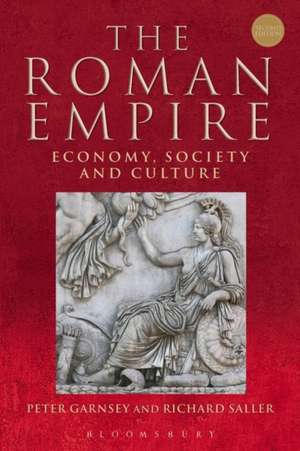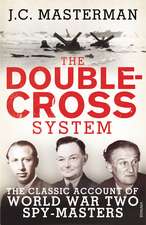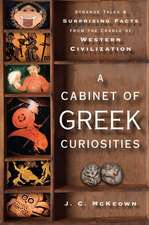The Roman Empire: Economy, Society and Culture
Autor Peter Garnsey, Richard Salleren Limba Engleză Paperback – 19 noi 2014
| Toate formatele și edițiile | Preț | Express |
|---|---|---|
| Paperback (2) | 187.85 lei 6-8 săpt. | +47.55 lei 6-12 zile |
| University of California Press – 13 noi 2014 | 240.06 lei 3-5 săpt. | |
| Bloomsbury Publishing – 19 noi 2014 | 187.85 lei 6-8 săpt. | +47.55 lei 6-12 zile |
Preț: 187.85 lei
Preț vechi: 216.22 lei
-13% Nou
Puncte Express: 282
Preț estimativ în valută:
35.96€ • 37.75$ • 29.70£
35.96€ • 37.75$ • 29.70£
Carte tipărită la comandă
Livrare economică 30 ianuarie-13 februarie 25
Livrare express 25-31 decembrie pentru 57.54 lei
Preluare comenzi: 021 569.72.76
Specificații
ISBN-13: 9781472524027
ISBN-10: 1472524020
Pagini: 352
Ilustrații: 11 colour and 5 bw illus
Dimensiuni: 156 x 234 x 22 mm
Greutate: 0.5 kg
Ediția:2nd edition
Editura: Bloomsbury Publishing
Colecția Bloomsbury Academic
Locul publicării:London, United Kingdom
ISBN-10: 1472524020
Pagini: 352
Ilustrații: 11 colour and 5 bw illus
Dimensiuni: 156 x 234 x 22 mm
Greutate: 0.5 kg
Ediția:2nd edition
Editura: Bloomsbury Publishing
Colecția Bloomsbury Academic
Locul publicării:London, United Kingdom
Caracteristici
A ground-breaking title written by and featuring new contributions by world-leading experts
Notă biografică
Peter Garnsey is Emeritus Professor of the History of Classical Antiquity and a Fellow of Jesus College, University of Cambridge, UK. His publications include Social Status and Legal Privilege in the Roman Empire (1970), Famine and Food Supply in the Graeco-Roman World (1988), Ideas of Slavery from Aristotle to Augustine (1996), Cities, Peasants and Food (1998), Food and Society in Classical Antiquity (1999) and Thinking about Property: From Antiquity to the Age of Revolution (2007).Richard Saller is the Dean of the School of Humanities and Sciences at Stanford University, USA. He is the author of Personal Patronage under the Early Empire (1982) and Patriarchy, Property, and Death in the Roman Family (1994), and co-editor of The Cambridge Economic History of Greco-Roman World (2007).
Cuprins
PrefaceAbbreviationsMapPart I1. Introducing the Principate2. A Mediterranean Empire, Addendum3. Government without Bureaucracy, Addendum4. Enemies of Rome by M. Goodman, Addendum by M. GoodmanPart II5. An Underdeveloped Economy, Addendum6. The Land, Addendum7. Supplying the Roman Empire, AddendumPart III8. The Social Hierarchy, Addendum9. Family and Household, Addendum10. Social Relations, AddendumPart IV11. Religion, Addendum by R.L. Gordon12. Culture, Addendum by J. Elsner and G. WoolfConclusionBibliographySupplementary bibliographyList of EmperorsIndex
Recenzii
The second edition, like the original, is still as thought-provoking as it ever was. ... A chapter on the 'Enemies of Rome' by Martin Goodman adds an important strand to the book. ... Arguably the most important addition to the second edition is the inclusion of a new Chapter 1 entitled "Introducting the Principate". ... No shelf of Roman history books is really complete without a copy of Garnsey and Saller's The Roman Empire.
Brilliantly conceived by two of the greatest living authorities on ancient Rome and an instant classic when it first appeared, this magisterial work has been generously expanded and updated to incorporate the latest scholarship. We could not wish for a more penetrating analysis of the foundations of Roman civilization.
Garnsey & Saller's 'The Roman Empire' is unsurpassed as a clear and thought-provoking introduction to key themes and issues in the economic, social and cultural history of Rome. This new edition, expanding the book's scope and offering a guide to the most important recent research, ensures that it will remain essential reading for students for years to come.
A by now a classic introduction to the Roman Empire that was always much more than a mere introduction and whose contents have withstood the test of time, is now made available in an even better edition, with new contributions on resistance, religion, and culture, by Martin Goodman, Richard Gordon, Jas Elsner and Greg Woolf. The bibliographical addenda are mines of information: sure guides to the best of recent scholarship on every aspect of the empire covered by the authors. This new edition of The Roman Empire is highly recommended as simply the best entrée to the big aspects and the big problems of the Roman empire at the height of its power.
Freshly revised for the 21st century, Garnsey and Saller's masterful survey remains the indispensible introduction to society and the economy under the emperors. Scholars as well as students will mine its updated bibliographies for authoritative guidance to recent research, while the new chapters enhance the book's value for the classroom.
Packed with information and ideas, but concise and readable, this is by far the best available guide for students and the general reader to how the Roman Empire actually worked, and its enduring impact on the history of the Mediterranean world. Groundbreaking in its thematic approach when first published in 1987, it now benefits from an introductory survey of the Empire's political system, and supplements to each chapter which provide a bird's-eye view of the questions raised and debated in a generation of new research.
More than twenty-five years after the appearance of the first edition, this remains the only book in which students and researchers can read about the administrative, economic, social and mental structures of the early Roman empire. A new chapter on the 'enemies of Rome' (by Martin Goodman) and a long series of addenda on environmental history, economic history, urbanism, religion (by Richard Gordon), culture (by Jas Elsner and Greg Woolf) and other topics are of the highest standard and ensure this volume another long life span. In short, an unreplaced and perhaps irreplaceable book.
Brilliantly conceived by two of the greatest living authorities on ancient Rome and an instant classic when it first appeared, this magisterial work has been generously expanded and updated to incorporate the latest scholarship. We could not wish for a more penetrating analysis of the foundations of Roman civilization.
Garnsey & Saller's 'The Roman Empire' is unsurpassed as a clear and thought-provoking introduction to key themes and issues in the economic, social and cultural history of Rome. This new edition, expanding the book's scope and offering a guide to the most important recent research, ensures that it will remain essential reading for students for years to come.
A by now a classic introduction to the Roman Empire that was always much more than a mere introduction and whose contents have withstood the test of time, is now made available in an even better edition, with new contributions on resistance, religion, and culture, by Martin Goodman, Richard Gordon, Jas Elsner and Greg Woolf. The bibliographical addenda are mines of information: sure guides to the best of recent scholarship on every aspect of the empire covered by the authors. This new edition of The Roman Empire is highly recommended as simply the best entrée to the big aspects and the big problems of the Roman empire at the height of its power.
Freshly revised for the 21st century, Garnsey and Saller's masterful survey remains the indispensible introduction to society and the economy under the emperors. Scholars as well as students will mine its updated bibliographies for authoritative guidance to recent research, while the new chapters enhance the book's value for the classroom.
Packed with information and ideas, but concise and readable, this is by far the best available guide for students and the general reader to how the Roman Empire actually worked, and its enduring impact on the history of the Mediterranean world. Groundbreaking in its thematic approach when first published in 1987, it now benefits from an introductory survey of the Empire's political system, and supplements to each chapter which provide a bird's-eye view of the questions raised and debated in a generation of new research.
More than twenty-five years after the appearance of the first edition, this remains the only book in which students and researchers can read about the administrative, economic, social and mental structures of the early Roman empire. A new chapter on the 'enemies of Rome' (by Martin Goodman) and a long series of addenda on environmental history, economic history, urbanism, religion (by Richard Gordon), culture (by Jas Elsner and Greg Woolf) and other topics are of the highest standard and ensure this volume another long life span. In short, an unreplaced and perhaps irreplaceable book.













